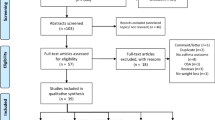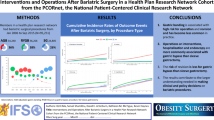Abstract
Introduction
Asthma is an important healthcare problem affecting millions in the United States. Additionally, a large proportion of patients with asthma suffer from obesity. These patients exhibit poor asthma control and reduced therapy response, increasing utilization of healthcare resources. Pulmonary symptoms improve after bariatric surgery (BS), and we hypothesized that asthma medication usage would decrease following BS.
Methods
A retrospective data analysis was performed in adult patients from a single institution’s database. Patients with obesity using at least one asthma medication pre-operatively who underwent BS were studied for up to 3-years post-operation. Poisson generalized linear mixed models for repeated measures were used to evaluate the effects of time and procedure type on the number of asthma medication.
Results
Bariatric patients with at least one prescribed asthma medication (mean 1.4 ± 0.6) were included (n = 751). The mean age at time of operation was 46.8 ± 11.6 years, mean weight was 295.9 ± 57 lbs, and mean body mass index (BMI) was 49 ± 8.2 kg/m2; 87.7% were female, 33.4% had diabetes, 44.2% used gastroesophageal reflux disease (GERD) medication, and 64.4% used hypertension medication. The most common procedure was Roux-en-Y gastric bypass (79%), followed by sleeve gastrectomy (10.7%), adjustable gastric banding (8.1%), and duodenal switch (2.3%). The mean number of prescribed asthma medications among all procedures decreased by 27% at 30 days post-operation (p < 0.0001), 37% at 6 months (p < 0.0001), 44% at 1 year (p < 0.0001), and 46% at 3 years (p < 0.0001) after adjusting for risk factors. No significant differences in medication use over time between procedure types were observed. In the adjusted analysis, the mean number of asthma medications was 12% higher in patients using at least one GERD medication (p = 0.015) and 8% higher with 10-unit increase in pre-operative BMI (p = 0.006).
Conclusion
BS significantly decreases asthma medication use starting 30 days post-operation with a sustained reduction for up to 3 years.
Similar content being viewed by others
References
Ogden CL, Carroll MD, Fryar CD, Flegal KM (2015) Prevalence of obesity among adults and youth: United States, 2011–2014. National Health and Nutrition Examination Survey. CDC 219:1–8
Peters-Golden M, Swern A, Bird SS, Hustard CM, Grant E, Edelman JM (2006) Influence of body mass index on the response to asthma controller agents. Eur Respir J 27(3):495–503
Beuther DA, Sutherland ER (2007) Overweight, obesity, and incident asthma: a meta-analysis of prospective epidemiologic studies. Am J Respir Crit Care Med 175(7):661–666
Varraso R, Siroux V, Maccario J, Pin I, Kauffmann F, Epidemiological Study on the Genetics and Environment of Asthma (2005) Asthma severity is associated with body mass index and early menarche in women. Am J Respir Crit Care Med 171(4):334–339
Boulet LP (2008) Influence of obesity on the prevalence and clinical features of asthma. Clin Invest Med 31(6):386–390
Engeland A, Bjørge T, Selmer RM, Tverdal A (2003) Height and body mass index in relation to total mortality. Epidemiology 14(3):293–299
Heacock T, Lugogo N (2014) Role of weight management in asthma symptoms and control. Immunol Allergy Clin North Am 34(4):797–808
Haslam DW, James WP (2005) Obesity. Lancet 366(9492):1197–1209
Schatz M, Zeiger RS, Yang SJ, Chen W, Sajjan S, Allen-Ramey F, Camargo CA Jr (2015) Prospective study on the relationship of obesity to asthma impairment and risk. J Allergy Clin Immunol Pract 3(4):560–565
Camargo CA Jr, Weiss ST, Zhang S, Willett WC, Speizer FE (1999) Prospective study of body mass index, weight change, and risk of adult-onset asthma in women. Arch Intern Med 159(21):2582–2588
Haldar F, Pavord ID, Shaw DE, Berry MA, Thomas M, BrightliDng CE, Wardlaw AJ, Green RH (2008) Cluster analysis and clinical asthma phenotypes. Am J Respir Crit Care Med 178(3):218–224
Moore WC, Meyers DA, Wenzel SE, Teague WG, Li H, Li X, D’Agostino R Jr, Castro M, Curran-Everett D, Fitzpatrick AM, Gaston B, Jarjour NN, Sorkness R, Calhoun WJ, Chung KF, Comhair SA, Dweik RA, Israel E, Peters SP, Busse WW, Erzurum SC, Bleecker ER (2010) National heart lung and blood institute’s severe asthma research program. Am J Respir Crit Care Med 181(4):315–323
Sturm R, An R (2014) Obesity and economic environments. CA Cancer J Clin 64(5):337–350
Pakhale S, Baron J, Dent R, Vandemheen K, Aaron SD (2015) Effects of weight loss on airway responsiveness in obese adults with asthma: does weight loss lead to reversibility of asthma? Chest 147(6):1582–1590
Sikka N, Wegienka G, Havstad S, Genaw J, Carlin AM, Zoratti E (2010) Respiratory medication prescriptions before and after bariatric surgery. Ann Allergy Asthma Immunol 104(4):326–330
Angrisani L, Santonicola A, Iovino P, Vitello A, Zundel N, Buchwald H, Scopinaro N (2017) Bariatric surgery and endoluminal procedures: IFSO Worldwide survey 2014. Obes Surg 27(9):2290–2292
Sjostrom L (2008) Bariatric surgery and reduction in morbidity and mortality: experiences from the SOS study. Int J Obes 32(7):93–97
Scott HA, Wood LG, Gibson PG (2017) Role of obesity in asthma: mechanisms and management strategies. Curr Allergy Asthma Rep 17(8):53
Hewitt S, Humerfelt S, Søvik TT, Aasheim ET, Risstad H, Kristinsson J, Mala T (2014) Long-term improvements in pulmonary function 5 years after bariatric surgery. Obes Surg 24(5):705–711
Nguyen NT, Hinojosa MW, Smith BR, Gray J, Varela E (2009) Improvement of restrictive and obstructive pulmonary mechanics following laparoscopic bariatric surgery. Surg Endosc 23(4):808–812
van Huisstede A, Rudolphus A, Castro Cabezas M, Biter LU, van de Geijn GJ, Taube C, Hiemstra PS, Braunstahl GJ (2015) Effect of bariatric surgery on asthma control, lung function and bronchial and systemic inflammation in morbidily obese subjects with asthma. Thorax 70(7):659–667
National Asthma in Education and Prevention Program (2007) Expert panel report 3 (EPR-3): guidelines for the diagnosis and management of asthma—summary report 2007. J Allergy Clin Immunol 120(5):94–138
Katz PO, Gerson LB, Vela MF (2013) Guidelines for the diagnosis and management of gastroesophageal reflux disease. Am J Gastroenterol 108:308–328
James PA, Oparil S, Carter BL, Cushman WC, Dennison-Himmelfarb C, Handler J, Lackland DT, LeFevre ML, MacKenzie TD, Ogedegbe O, Smith SC, Svetkey LP, Taler SJ, Townsend RR, Wright JT, Narva AS, Ortiz E (2014) 2014 evidence-based guideline for the management of high blood pressure in adults. JAMA 311(5):507–520
Hampton T (2014) Studies probe links between childhood asthma and obesity. JAMA 311:1718–1719
Al-Alwan A, Bates JH, Chapman DG, Kamisnsky DA, DeSarno MJ, Irvin CG, Dixon AE (2014) The nonallergic asthma of obesity a matter of distal lung compliance. Am J Respir Crit Care Med 189(12):1494–1502
Umetsu DT (2017) Mechanism by which obesity impacts upon asthma. Thorax 72(2):174–177
Bildstrup L, Backer V, Thomsen SF (2015) Increased body mass index predicts severity of asthma symptoms but not objective asthma traits in a large sample of asthmatics. J Ashtma 52(7):687–692
Dixon AE, Holquin F, Sood A, Salome CM, Pratley RE, Beuther DA, Celedon JC, Shore SA, American Thoracic Society Ad Hoc Subcommittee on Obesity and Lung Disease (2010) An official american thoracic society workshop report: obesity and asthma. Proc Am Thorac Soc 7(5):325–335
Mohanan S, Tapp H, McWilliams A, Dulin M (2014) Obesity and asthma: pathophyisiology and implications for diagnosis and management in primary care. Exp Biol Med 239(11):1531–1540
Mukadam S, Zacharias J, Henao MP, Kraschnewski J, Ishmael F (2017) Differential effects of obesity on eosinophilic vs. non-eosinophilic asthma subtypes. J Asthma 28:1–6
Gibeon D, Batuwita K, Osmond M, Heany LG, Brightling CE, Niven R, Mansur A, Chaudhuri R, Bucknall CE, Rowe A, Guo Y, Bhavsar PK, Chung KF, Menzies-Gow A (2013) Obesity-associated severe asthma represents a distinct clinical phenotype: analysis of the british thoracic society difficult asthma registry patient cohort according to BMI. Chest 143(2):406–414
Gupta S, Lodha R, Kabra SK (2017) Asthma, GERD and obesity: triangle of inflammation. Indian J Pediatr. https://doi.org/10.1007/s12098-017-2484-0
Priyadarshini P, Singh VP, Aggarwal S, Garg H, Sinha S, Guleria R (2017) Impact of bariatric surgery on obstructive sleep apnoea-hypopnea syndrome in morbidly obese patients. J Minim Acces Surg 13(4):291–295
Hariri K, Kini SU, Herron DM, Fernandez-Ranvier G (2017) Resolution of symptomatic obstructive sleep apnea not impacted by preoperative body mass index, choice of operation between sleeve gastrectomy and Roux-en-Y gastric bypass surgery, or severity. Obes Surg. https://doi.org/10.1007/s11695-017-3042-6
Reddy RC, Baptist AP, Fan Z, Carlin AM, Birkmeyer NJ (2011) The effects of bariatric surgery on asthma severity. Obes Surg 21(2):200–206
Acknowledgements
The authors would like to thank Dr. Loretta Que and Mr. James Alexander for their contributions to this study.
Author information
Authors and Affiliations
Corresponding author
Ethics declarations
Disclosures
Daniel Guerron is a consultant and speaker for Levita and Mederi and a speaker for Medtronic and Gore. Camila Ortega, Hui-Jie Lee, and Gerardo Davalos have nothing to disclose. Jennifer Ingram has the following funding from the National Institutes of Health: NIH/NHLBI 1R01HL130234-01A1 and no other disclosures to report. Dana Portenier is a consultant for Medtronic/Covidien, Teleflex, Allergan, Gore, and Intuitive. Additionally he holds a grant from Teleflex. Research reported in this publication was supported by the National Center For Advancing Translational Sciences of the National Institutes of Health under Award Number UL1TR002553. The content is solely the responsibility of the authors and does not necessarily represent the official views of the National Institutes of Health.
Rights and permissions
About this article
Cite this article
Guerron, A.D., Ortega, C.B., Lee, HJ. et al. Asthma medication usage is significantly reduced following bariatric surgery. Surg Endosc 33, 1967–1975 (2019). https://doi.org/10.1007/s00464-018-6500-x
Received:
Accepted:
Published:
Issue Date:
DOI: https://doi.org/10.1007/s00464-018-6500-x




